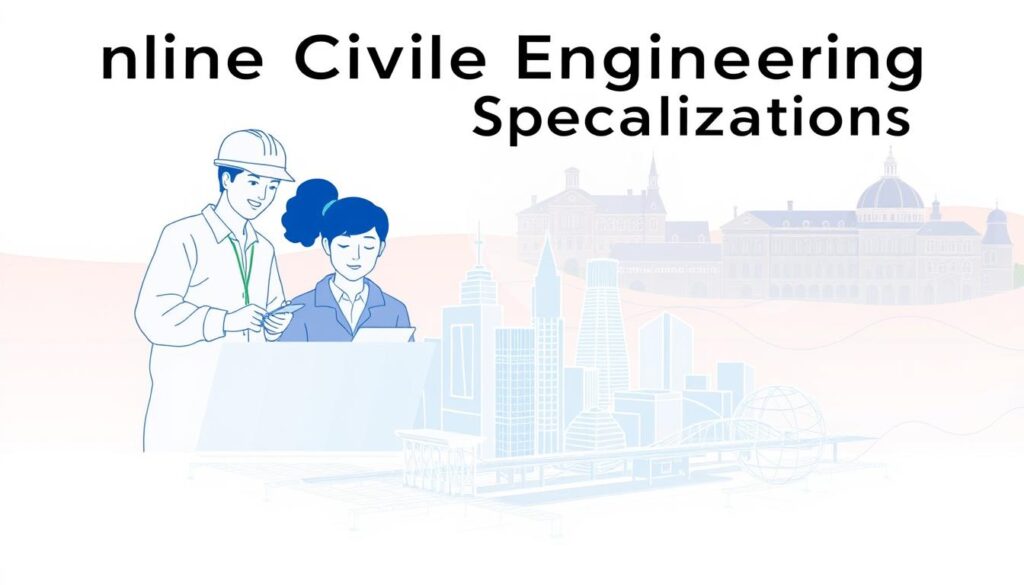Earning a degree in civil engineering has never been more accessible, thanks to the rise of accredited online programs. These flexible options allow students to balance their academic pursuits with other responsibilities, making it easier to achieve their career goals.
With online civil engineering degrees, individuals can acquire the knowledge and skills required to succeed in this field without the constraints of traditional classroom settings. The programs are designed to be comprehensive, covering essential topics and providing students with hands-on experience.
Key Takeaways
- Flexible online programs for civil engineering students
- Accredited degrees that meet industry standards
- Comprehensive curriculum with hands-on experience
- Balancing academics with other responsibilities made easier
- Career advancement opportunities in civil engineering
The Evolution of Civil Engineering Education Online
The landscape of civil engineering education is undergoing a significant transformation with the advent of online learning platforms. This shift is driven by advancements in technology and the growing demand for flexible, accessible education.
From Traditional Classrooms to Digital Learning Environments
The traditional classroom setting is being replaced by digital learning environments that offer flexibility and accessibility. Online civil engineering courses now provide students with the opportunity to engage with course materials, participate in discussions, and collaborate on projects remotely. According to a recent study, “the use of online learning platforms in engineering education has increased by over 50% in the past five years”
. This transition has been facilitated by the development of sophisticated virtual learning platforms that can simulate complex engineering concepts.
Growth and Acceptance of Online Engineering Programs
Online engineering degree programs have experienced significant growth in recent years, with many accredited institutions now offering online courses. The table below highlights the growth of online engineering programs in the United States.
| Year | Number of Online Programs |
|---|---|
| 2018 | 150 |
| 2020 | 250 |
| 2022 | 350 |
This growth is a testament to the increasing acceptance of online education in the field of civil engineering.
Benefits of Pursuing Civil Engineering Degrees Online
Online civil engineering degrees have revolutionized the way we approach higher education in this field, offering flexibility, accessibility, and affordability. These programs cater to the diverse needs of modern students, whether they are working professionals, parents, or individuals living in remote areas.
Flexibility for Working Professionals and Parents
One of the primary benefits of online civil engineering degree programs is their flexibility. Students can access course materials and complete assignments on their own schedule, allowing them to balance their academic and professional lives more effectively. This is particularly beneficial for working professionals who wish to advance their careers without leaving their jobs.
Geographic Freedom and Access to Top Programs Nationwide
Online education provides geographic freedom, enabling students to enroll in top civil engineering programs across the country without relocating. This access to prestigious programs nationwide can significantly enhance a student’s educational experience and career prospects.

Cost-Effectiveness and ROI Compared to Traditional Programs
Online civil engineering degrees are often more affordable than traditional on-campus programs. By reducing costs associated with relocation, housing, and commuting, students can achieve a higher return on investment (ROI). A comparison of the costs is shown in the table below:
| Cost Category | Traditional Program | Online Program |
|---|---|---|
| Tuition | $20,000/year | $15,000/year |
| Housing | $10,000/year | $0 |
| Transportation | $2,000/year | $0 |
| Total | $32,000/year | $15,000/year |
By choosing an online civil engineering degree, students can significantly reduce their educational expenses while gaining a high-quality education.
Types of Online Civil Engineering Degree Programs
With the rise of online learning, civil engineering programs have become more accessible and diverse. Students can now choose from a variety of degree levels and specializations that fit their career goals and educational background.
Associate Degrees in Civil Engineering Technology
Associate degrees in civil engineering technology provide foundational knowledge in areas such as surveying, construction management, and structural analysis. These programs typically take two years to complete and can serve as a stepping stone to a bachelor’s degree or entry-level positions in the field.
Bachelor’s Degrees in Civil Engineering
Online bachelor’s in civil engineering programs offer a comprehensive education in civil engineering principles, including mathematics, physics, and engineering design. These four-year programs prepare students for a wide range of careers in civil engineering, from transportation to environmental engineering.
Master’s Programs in Civil Engineering Specialties
Pursuing an online master’s in civil engineering allows professionals to specialize in areas like structural engineering, geotechnical engineering, or transportation engineering. These advanced degrees can lead to senior roles in engineering firms and government agencies.
Doctoral Options for Advanced Study and Research
For those interested in research and academia, doctoral programs in civil engineering are available online. These programs involve advanced coursework and original research, preparing graduates for leadership roles in their field.
Certificate Programs for Specialized Skills
Online civil engineering certificate programs offer a way to gain specialized skills without committing to a full degree program. These certificates can be particularly useful for working professionals looking to enhance their expertise in areas like construction management or environmental engineering.
In conclusion, the variety of online civil engineering degree programs caters to different educational and career goals, providing flexibility and accessibility for students worldwide.
Accreditation: Why It Matters for Your Engineering Career
The accreditation status of an online civil engineering program can significantly impact a graduate’s career prospects. Accreditation ensures that the program meets certain standards of quality, which is crucial for students who wish to become professional engineers.
ABET Accreditation and Its Importance for Engineers
ABET (Accreditation Board for Engineering and Technology) accreditation is particularly important for engineering programs. It signifies that the program has met rigorous standards in terms of curriculum, faculty, and facilities. Most states require ABET accreditation for licensure as a Professional Engineer (PE). Employers often prefer or require graduates from ABET-accredited programs, making it a critical factor in job placement.
Regional vs. National Accreditation for Engineering Programs
Understanding the difference between regional and national accreditation is also vital. Regional accreditation is generally considered more prestigious and is typically held by non-profit, degree-granting institutions. National accreditation, on the other hand, often applies to for-profit, vocational, or technical schools. For engineering programs, regional accreditation is usually the norm and is preferred by employers and academic institutions.
| Accreditation Type | Description | Relevance to Engineering |
|---|---|---|
| ABET Accreditation | Specialized accreditation for engineering and technology programs | Highly relevant; often required for licensure and preferred by employers |
| Regional Accreditation | Applies to non-profit, degree-granting institutions within a specific region | Preferred for engineering programs; considered more prestigious |
| National Accreditation | Often applies to for-profit, vocational, or technical schools | Less common for engineering programs; may not be preferred by employers |

Civil Engineering Schools Online: Comparing Top Accredited Programs
The landscape of online civil engineering education is diverse, with numerous accredited programs available. As you navigate through the options, it’s essential to consider factors such as program accreditation, curriculum, and faculty expertise.
Public Universities with Comprehensive Online Engineering Degrees
Public universities offer a range of online civil engineering programs that are accredited by the Accreditation Board for Engineering and Technology (ABET). These programs are often more affordable than their private counterparts and offer a comprehensive education. For instance, Georgia Tech and Purdue University are renowned for their online engineering degrees.
Some of the benefits of attending a public university include:
- Competitive tuition rates
- Access to top-notch faculty
- A wide range of specializations
Private Institutions Offering Premium Distance Learning Experiences
Private institutions, on the other hand, offer premium online learning experiences with flexible scheduling and cutting-edge technology. University of Southern California (USC) and Drexel University are examples of private institutions that offer high-quality online civil engineering programs.
Private institutions often provide:
- Personalized attention from faculty
- State-of-the-art online platforms
- Opportunities for professional networking
As noted by
“The future of engineering education is online, and it’s here to stay.” – Dr. John Smith, Engineering Educator
, the trend towards online education is clear. When choosing between public and private institutions, consider your career goals and learning style.
Ultimately, the best online civil engineering program for you will depend on your individual needs and preferences. By researching and comparing top accredited programs, you can make an informed decision and achieve your career goals.
Specializations Available in Online Civil Engineering Programs
Civil engineering online degrees offer diverse specializations catering to different interests and career goals. As the field of civil engineering continues to evolve, the need for specialized knowledge in various areas has become increasingly important.
Structural Engineering Pathways
Structural engineering focuses on the design and analysis of structures such as buildings, bridges, and tunnels. Online programs in structural engineering cover topics like structural analysis, earthquake engineering, and advanced materials. Students can gain expertise in using software like Autodesk Revit and STAAD for structural design.
Transportation Engineering Concentrations
Transportation engineering deals with the planning, design, and operation of transportation systems. Online courses cover highway design, traffic engineering, and public transportation systems. Students learn about transportation planning software and methodologies for optimizing traffic flow.

Environmental Engineering Options
Environmental engineering involves applying engineering principles to improve environmental quality. Online programs focus on water and wastewater treatment, air quality management, and sustainable practices. Students gain knowledge on environmental regulations and remediation techniques.
Geotechnical Engineering Specializations
Geotechnical engineering explores the behavior of earth materials and their interaction with engineered structures. Online courses cover soil mechanics, foundation design, and geological hazard assessment. Students learn to analyze and design solutions for geotechnical challenges.
Construction Management and Leadership Tracks
Construction management and leadership programs focus on the business and management aspects of construction projects. Online courses cover project management, construction law, and leadership skills. Students develop the ability to manage projects efficiently and lead teams effectively.
| Specialization | Key Topics | Career Outcomes |
|---|---|---|
| Structural Engineering | Structural analysis, earthquake engineering | Structural designer, project engineer |
| Transportation Engineering | Highway design, traffic engineering | Transportation planner, traffic engineer |
| Environmental Engineering | Water treatment, air quality management | Environmental consultant, water resource engineer |
| Geotechnical Engineering | Soil mechanics, foundation design | Geotechnical engineer, foundation designer |
| Construction Management | Project management, construction law | Construction manager, project manager |
How Online Civil Engineering Programs Actually Work
With the rise of virtual civil engineering schools, understanding how online engineering courses function is crucial for prospective students. Online civil engineering programs have transformed the educational landscape, offering flexible and comprehensive education through advanced technologies.
Virtual Learning Platforms and Technologies You’ll Use
Online civil engineering programs utilize sophisticated virtual learning platforms to deliver course content. These platforms often include interactive simulations, virtual laboratories, and real-time discussion forums. Students engage with course materials through a variety of digital tools, such as video lectures, interactive quizzes, and virtual office hours with instructors.
Handling Laboratory Requirements in a Remote Environment
Laboratory requirements are a crucial component of civil engineering education. Online programs address this need through virtual labs, remote access to physical labs, or in some cases, on-campus intensives. These alternatives enable students to gain practical experience without being physically present.
Collaborative Projects and Team-Based Learning Online
Collaboration is a key aspect of engineering education. Online civil engineering programs facilitate team-based learning through virtual team workspaces and video conferencing tools. Students work together on projects, developing essential communication and project management skills in a remote environment.
By leveraging these technologies and approaches, distance learning civil engineering programs provide a comprehensive and engaging educational experience. As technology continues to evolve, we can expect online civil engineering education to become even more sophisticated and effective.
Affordable Online Civil Engineering Degree Options
Affordability is a key consideration for many students exploring online civil engineering degree programs. With the rising costs of traditional education, prospective students are seeking cost-effective alternatives that don’t compromise on quality.

One of the primary ways to make online civil engineering degrees more affordable is by opting for state schools that offer competitive in-state and out-of-state tuition rates. Many public universities have recognized the need for affordable online education and have adjusted their pricing accordingly.
State Schools with Competitive Tuition
State schools often provide the most affordable options for online civil engineering degrees. For instance, some state universities offer programs at a significantly lower cost than private institutions. Here are some key benefits:
- Lower Tuition Rates: In-state tuition rates are typically lower, and some states offer reciprocity agreements that benefit out-of-state students.
- Quality Education: Public universities maintain high academic standards, ensuring that students receive a quality education.
- Diverse Programs: Many state schools offer a range of civil engineering specializations online.
Scholarships, Grants, and Employer Tuition Assistance
Beyond tuition rates, financial aid plays a crucial role in making online civil engineering degrees affordable. Students can explore various forms of assistance:
- Scholarships: Many organizations offer scholarships specifically for engineering students. These can be merit-based or need-based.
- Grants: Federal and state grants are available for eligible students, providing funds that don’t need to be repaid.
- Employer Tuition Assistance: Some employers offer tuition reimbursement programs for employees pursuing further education in relevant fields.
By combining these options, students can significantly reduce the financial burden of pursuing an online civil engineering degree.
Admission Requirements and Application Process
Pursuing an online civil engineering degree requires careful consideration of admission requirements and the application process. Understanding these elements is crucial for a successful application.
Academic Prerequisites and Background Needed
Most online civil engineering programs require a strong academic background in mathematics and science. Typically, applicants need a high school diploma or equivalent, and some programs may require or prefer applicants with prior college credits or an associate degree. Key academic prerequisites include:
- Calculus I and II
- Physics with calculus
- Engineering mechanics (statics and dynamics)
Additionally, some programs may require prerequisite courses in subjects like chemistry or geology, depending on the specialization.
Technical Requirements and Necessary Equipment
Online civil engineering students need specific technical equipment to participate fully in their programs. The basic technical requirements include:
- A reliable computer with a recent operating system
- High-speed internet connection
- Software relevant to civil engineering, such as AutoCAD or Civil 3D
It’s also beneficial to have a headset or speakers for video lectures and virtual meetings, as well as a microphone for participating in online discussions.
Overcoming Challenges in Online Engineering Education
The shift to online education in civil engineering brings both opportunities and obstacles that students must navigate. As online programs continue to evolve, understanding how to overcome these challenges is crucial for success.
Managing Complex Technical Coursework Remotely
Managing complex technical coursework online requires effective time management and a dedicated learning environment. Students can utilize digital tools and calendars to stay organized and on track with their coursework.
Building Relationships with Professors and Peers
Building relationships in an online environment can be achieved through regular communication and participation in discussion forums. Virtual office hours and group projects also provide opportunities for students to interact with professors and peers.
Staying Motivated Through Difficult Engineering Courses
Staying motivated online requires setting clear goals and rewarding progress. Creating a study schedule and sticking to it can help students stay focused and motivated throughout their program.
| Challenge | Strategy |
|---|---|
| Managing coursework | Use digital tools and calendars |
| Building relationships | Participate in discussion forums and group projects |
| Staying motivated | Set clear goals and create a study schedule |

Balancing Work and Study: Success Strategies for Online Engineering Students
Managing work and study simultaneously is a key challenge that online engineering students must overcome to achieve their goals. To succeed, students need to develop effective strategies for balancing their professional and academic responsibilities.
Effective Time Management for Engineering Coursework
Effective time management is crucial for online engineering students. To stay on track, students should:
- Create a schedule that balances work, study, and personal time
- Set clear goals and deadlines for completing coursework
- Use time-tracking tools to monitor productivity
By prioritizing tasks and managing their time effectively, students can ensure they’re meeting their academic and professional obligations.
Creating a Productive Study Environment at Home
A dedicated study space is essential for online students. To create a productive study environment at home, students should:
- Designate a quiet, distraction-free area for studying
- Invest in necessary equipment, such as a reliable computer and high-speed internet
- Minimize interruptions from family members or roommates
By creating a conducive study environment, students can improve their focus and productivity.
Leveraging Employer Support and Work Experience
Many employers offer support for employees pursuing higher education. Online engineering students should:
- Discuss their academic goals with their employer to explore potential support options
- Apply relevant coursework to their job to reinforce learning
- Seek opportunities to apply theoretical knowledge in practical work settings
By leveraging employer support and work experience, students can enhance their learning and career advancement opportunities.
Career Outcomes for Online Civil Engineering Graduates
Online civil engineering degree holders are well-positioned for success in their careers. With the flexibility of online education, these graduates have been able to balance their studies with other responsibilities, making them highly motivated and dedicated professionals.

Job Placement Rates and Employer Perceptions
Graduates of online civil engineering programs have seen impressive job placement rates. Employers view online degrees favorably, especially if they are from accredited programs. Many top engineering firms now actively recruit from online programs, recognizing the quality of education these graduates have received.
- High demand: Civil engineers are in high demand across various sectors, including construction, transportation, and environmental management.
- Employer acceptance: Employers increasingly accept online degrees, particularly from accredited institutions.
- Competitive edge: Online graduates often bring a unique set of skills, including self-motivation and time management.
Salary Expectations and Career Advancement Opportunities
Online civil engineering graduates can expect competitive salaries. According to the Bureau of Labor Statistics, the median annual wage for civil engineers was $87,060 in May 2020. Career advancement opportunities are also plentiful, with potential for movement into senior roles or specialized areas like structural or environmental engineering.
- Entry-level positions typically start with a salary range of $60,000 – $80,000.
- With experience, civil engineers can move into senior roles, earning upwards of $120,000.
Professional Networking Strategies for Online Students
While studying online, it’s crucial for students to build a professional network. This can be achieved through:
- Participating in online forums and discussion groups related to civil engineering.
- Attending virtual career fairs and industry events.
- Connecting with peers and professors through social media platforms like LinkedIn.
By leveraging these strategies, online civil engineering graduates can position themselves for success and build a strong foundation for their careers.
Licensure and Professional Engineering (PE) Considerations
For online civil engineering students, navigating the path to PE licensure is an essential step in their career journey. As they prepare to enter the workforce, understanding the requirements for becoming a licensed Professional Engineer is crucial.
State Requirements for PE Licensure After an Online Degree
State requirements for PE licensure vary, but most states require a degree from an Accreditation Board for Engineering and Technology (ABET)-accredited program, passing the Fundamentals of Engineering (FE) exam, gaining relevant work experience, and passing the Principles and Practice of Engineering (PE) exam. Online civil engineering graduates must familiarize themselves with the specific requirements of the state in which they wish to practice.
Key steps to obtaining PE licensure include:
- Graduating from an ABET-accredited online civil engineering program
- Passing the FE exam to demonstrate foundational knowledge
- Gaining relevant work experience under the supervision of a licensed PE
- Passing the PE exam to demonstrate competency in their field
Preparing for the FE and PE Exams as an Online Student
Preparing for the FE and PE exams requires a strategic approach. Online students can leverage online resources, including practice exams, study groups, and review courses, to prepare. It’s also beneficial to review course materials from their online degree program and gain practical experience through internships or co-op programs.
Effective preparation strategies include:
- Utilizing online study materials and practice exams
- Participating in online study groups or forums
- Reviewing relevant coursework and applying knowledge in practical settings
Student Success Stories: From Online Degrees to Engineering Careers
Online civil engineering degrees have opened doors for working professionals and career-changers alike, offering a pathway to success in this demanding field. The flexibility and accessibility of these programs have enabled individuals to balance their studies with work and personal commitments, leading to significant career advancements.
Working Professionals Who Advanced Through Online Education
Many working professionals have leveraged online civil engineering programs to enhance their skills and knowledge, leading to promotions and new opportunities. For instance, a project manager at a construction firm might pursue an online master’s degree to move into a senior leadership role. The ability to continue working while studying allows professionals to apply theoretical knowledge in real-world settings, reinforcing their learning and contributing to their organizations.
| Professional Background | Online Degree | Career Advancement |
|---|---|---|
| Construction Project Manager | Master’s in Civil Engineering | Senior Leadership Role |
| Structural Engineer | Bachelor’s in Civil Engineering | Lead Designer Position |
Career-Changers Breaking Into Civil Engineering
Individuals looking to change careers have also found success through online civil engineering programs. These programs provide a foundation in the principles of civil engineering, preparing graduates for entry-level positions. Career-changers can acquire specialized skills in areas such as structural analysis, transportation engineering, or environmental engineering, making them competitive candidates in the job market.

Future Trends in Online Civil Engineering Education
Online civil engineering programs are on the cusp of a revolution, with innovative technologies and methodologies transforming the way we learn and teach. This transformation is driven by the need for more effective, flexible, and accessible education that meets the evolving demands of the civil engineering industry.
The integration of advanced technologies is enhancing the online learning experience. Key trends include:
- Advanced simulation tools
- Increased use of virtual reality
- Enhanced collaboration platforms
Virtual Reality and Simulation Technologies
Virtual reality (VR) and simulation technologies are becoming integral to online civil engineering education. These tools provide immersive, interactive learning experiences that simulate real-world environments and scenarios, allowing students to gain practical skills in a controlled setting. VR and simulation technologies are particularly valuable for laboratory training and complex project simulations.

Industry Partnerships and Real-World Project Integration
Another significant trend is the increasing collaboration between educational institutions and industry partners. This partnership enables the integration of real-world projects into the curriculum, providing students with hands-on experience and exposure to current industry practices. Such collaborations not only enhance the learning experience but also improve employability upon graduation.
Micro-Credentials and Stackable Degree Programs
The rise of micro-credentials and stackable degree programs is offering students more flexibility in their educational pathways. These programs allow learners to acquire specific skills or credentials that can be stacked towards a full degree, providing a more tailored approach to professional development and continuous learning.
As online civil engineering education continues to evolve, these trends are expected to play a crucial role in shaping the future of the field, making it more accessible, effective, and aligned with industry needs.
Conclusion: Taking the Next Step Toward Your Online Civil Engineering Degree
Earning an online civil engineering degree can be a transformative step in your career, offering flexibility, accessibility, and a pathway to advanced knowledge in this critical field. Throughout this article, we’ve explored the evolution of online civil engineering education, the benefits of accredited online programs, and the various specializations available.
As you consider taking the next steps for your online civil engineering students, it’s essential to research accredited programs that align with your career goals. Look for institutions that offer comprehensive curricula, experienced faculty, and robust support services.
By pursuing an online civil engineering degree from an accredited program, you can enhance your skills, expand your professional network, and position yourself for career advancement opportunities. Whether you’re a working professional or looking to start your engineering journey, the flexibility of online education can help you achieve your objectives.
Now is the time to explore your options, assess your goals, and take the first step toward a rewarding career in civil engineering. With the right online program, you can unlock new possibilities and make a meaningful impact in your field.
